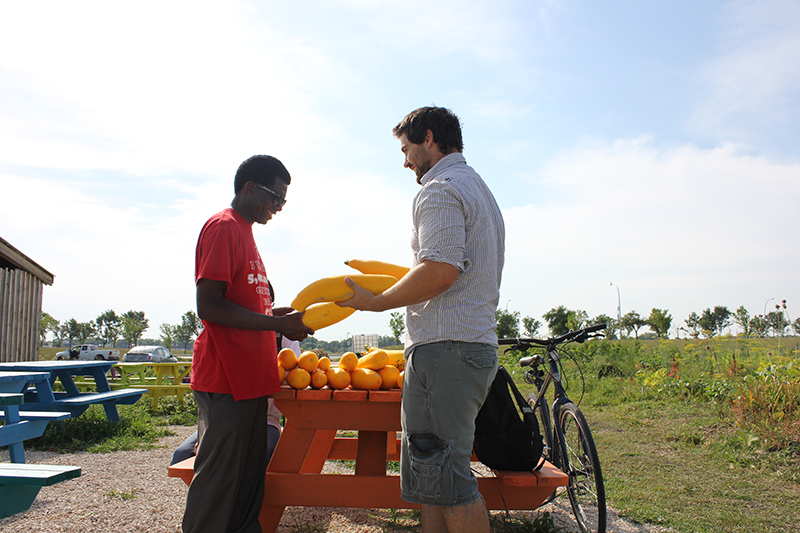
A harvest from the UMSU Garden at the Fort Garry campus // Photo courtesy of the Office of Sustainability
Conversations on sustainable food: Is it safe, healthy and just?
The University of Manitoba’s National Centre for Livestock and the Environment is hosting a special seminar and workshop on sustainable food systems on March 12 and 13.
Ralph Martin, Professor and Loblaw Chair in Sustainable Food Production at the University of Guelph, will present his lecture “Food Production for Enough Healthy Consumption” on March 12. He will join the workshop the following day to discuss food’s role in health and social justice issues.
Food Production for Enough Healthy Consumption (Thursday, March 12, 3:00 p.m.)
His March 12 lecture will tackle an issue most North Americans rarely, if ever, think about: our food consumption and production habits. Both, he’ll argue, need to change, and will change as food increases in price.
A hot topic in agricultural circles is how to feed a growing population. If the global population increases by 30-40 per cent, the thinking goes that food production will have to increase by 70-90 per cent because more and more people are going to eat meat.
Yes. But.
“I think we need to look at what kind of consumption we want in order to support healthy eating, and to think about the excess – some data from the US says people eat way more calories each day than they need. On top of that, 40 per cent of the food in North America is wasted. And the food we are eating is often bad for our health,” Martin says.
Productivity isn’t a problem: for instance, much of our grain feeds livestock (and we’re probably eating more meat than we should anyway), and lots of our corn crop gets turned to high fructose corn syrup. Rather, we need to produce the right amount of the right food, and then eat the right amount of that food.
Martin has done research on how much food people waste and their views of food waste. People, he said, aren’t aware of their bad habits. As food becomes more expensive, and it will, people will begin to value food more.
“When we think about agriculture and food we think of it as an issue of how to produce more. But I think we need to think about what we want to produce so we can improve our quality of life. Food is not about getting the best deal per 100 grams. It is more complex and nuanced than that. We can eat to improve our health, and if we do that we might be more happy, and we might have more joy in life. Who doesn’t like joy?”
Find the full details of the event here.
Sustainable Food Systems Workshop (Friday, March 13, 1:00 p.m.)
Building on the seminar, Martin will also be the guest speaker at the Sustainable Food Systems Workshop. This event, which is for the internal U of M community, is meant to continue dialogue among the U of M community on safe, healthy, just and sustainable food systems, hopefully putting knowledge into practice says Christine Rawluk. Rawluk is the research development coordinator with the U of M’s National Centre for Livestock and the Environment.
“This workshop is not intended to define what sustainable food is, nor is it to critique current food consumption models,” Rawluk says. “Rather it’s intended to bring together academics, students, and action-takers so that people researching, learning and working in the area of safe, healthy, just and sustainable food systems can share what they are doing and explore ways in which they might be able to come together to strengthen their efforts and impact.”
Food systems come in all shapes and sizes with their scales ranging from local to global. Within a single household for example, food purchases, preparation, waste and disposal function as an active food system. Food systems can also include raw food markets, following the production and trade of crops and livestock. The system could also function at an even larger scale, pertaining to a society’s access to food in general, which can be further defined by metrics of safety and nutrition of the food that is grown and consumed.
“Food systems encompass not only the growing, processing, distributing and consuming of food, but also how economies, cultures, communities and lifestyles are shaped around food,” Rawluk says. “As such the definition of sustainable food and the metrics for measuring the sustainability of a food system are complex. Chances are that if you asked 10 different people across our campus to define ‘sustainable food’ you would get 10 different answers. That is what we will learn at this workshop — different people’s ideas, knowledge and experiences with food systems, based on their particular interpretation of sustainable food systems.”
Find the full details of the event here.
Research at the University of Manitoba is partially supported by funding from the Government of Canada Research Support Fund.






